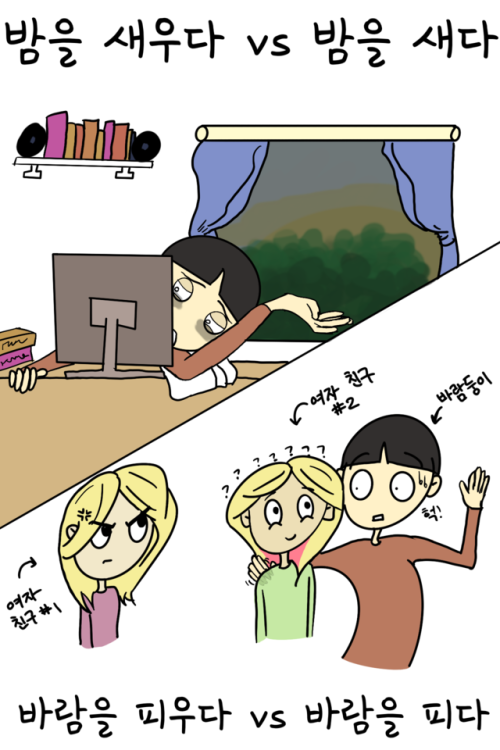#한국어 동사
Hey guys, today I have two interesting verbs for you.
새우다 and 피우다. The reason they are interesting is that you often don’t see them in their “correct” form while talking. Some of you might have even noticed this or wondered why you don’t see 새우다 and 피우다 often or if there is a difference.
In textbooks you’ll learn sentences like:
어제 밤을 새워서 공부했어요. I stayed up all night studying yesterday.
But, you don’t hear that sentence too often in real life conversations with friends. Instead, you hear this:
어제 밤을 새서 공부했어요. I stayed up all night studying.
Or
밤을 샜어요. I stayed up all night./I pulled an all-nighter.
In class, newspapers, and in the dictionary, you will (or should) find the verb as 새우다. But, most people (at least in Seoul) use the verb as 새다. 우 completely disappears. 피우다 is the same. In the dictionary and in your books, you’ll see 담배(를) 피우다 and 바람(을) 피우다. But, many people say 담배(를) 피다 and 바람(을) 피다.
밤을 새다 is technically incorrect. But, you’ll hear it more often than the correct version. It’s kind of like “who and whom” in the US. Most people don’t use “whom” at all. They use “who” incorrectly even if they know it’s wrong. That’s because for some weird reason using “who” wrong sounds more natural than using “whom” correctly.
Here are a few examples of the three most common words I’ve come across.
담배를 안 폈으면 좋겠어요. (*안 피웠으면) I wish you didn’t smoke cigarettes.
밤을 새지 마. 숙제는 내일 해. (*새우지 마) Don’t stay up all night. Do your homework tomorrow.
남자 친구가 바람을 피면 끝이야! (*바람을 피우면) If (my) boyfriend cheats, it’s over/it’s the end.
It’s strange that language sometimes sounds better when it’s wrong, right? Just one more reason to not stress about speaking “perfect Korean.” You should use the correct form when writing papers and on tests, but when you’re talking or texting, feel free to use it “incorrectly.”
Anyway, good luck studying guys!
Post link

